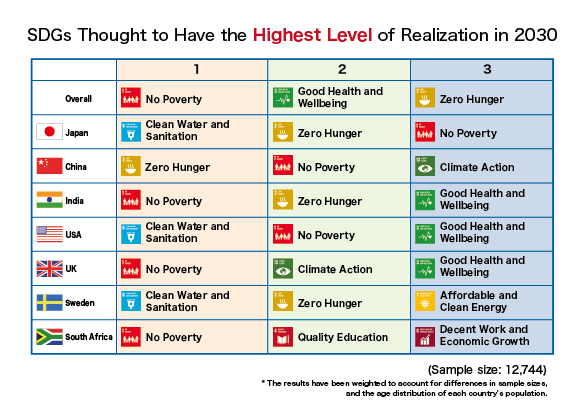Survey on the Awareness of Environmental Issues Among the General Public
2022.09.08Survey on the Awareness of Environmental Issues Among the General Public (in Japan and 24 other countries)
Climate change was rated as the top issue
The Asahi Glass Foundation, chaired by Takuya Shimamura, conducted an online survey of 13,332 people in Japan and 24 other countries in total, with 6,585 participants aged 18-24, and 6,747 participants aged 25-69. Its goal was to assess awareness and action regarding environmental issues. The survey was supervised by Professor Norichika Kanie, of Keio University. Its main findings were as follows:
- Overall, participants rated "Climate Change" as the most pressing environmental issue in the country or region where they reside and expressed concern over abnormal weather conditions. The number two issue was "Society, Economy and Environment, Policies, Measures," and the number three issue was "Water Resources."
- Participants rated Japan, the USA and Australia as the top three countries making progress in terms of public awareness and action on environmental issues. The reasons given for selecting Japan included "cutting-edge technology" and "cleanliness."
- The Sustainable Development Goals that participants thought will have the highest level of realization by 2030 were "No Poverty" (1st), "Good Health and Wellbeing" (2nd), and "Zero Hunger" (3rd). The SDGs that participants thought would have the lowest level of realization were "No Poverty" (1st), "Zero Hunger" (2nd), and "Quality Education" (3rd). Opinions were split on whether poverty can be eradicated, even among people from the same country, with developed nations giving more pessimistic answers.
- Around 30% of participants hadn't heard of the SDGs. 18-24-year-olds had a slightly higher awareness than 25-69-year-olds.
- When showing environmental crisis awareness time on a clock, from 0:01 to 12:00, participants of all age brackets averaged out at 7:25, meaning "fairly concerned." 18-24-year-olds averaged out slightly lower at 7:11, while 25-69-year-olds were at 7:27, meaning they were slightly more concerned. The average time given by global environmental experts was two hours ahead of the general public, at 9:35, "extremely concerned." But both experts and the general public expressed a sense of crisis.
Survey overview
| Goal | To assess the general public's awareness and behavior regarding environmental issues |
|---|---|
| Participants | 13,332 people (18-24-year-olds: 6,585, 25-69-year-olds: 6,747) |
| Locations | Japan, and 24 other countries (South Korea, China, Singapore, Indonesia, India, Australia, USA, Canada, Mexico, Brazil, UK, France, Germany, Italy, Spain, Belgium, Poland, Norway, Sweden, Turkey, UAE, Egypt, Nigeria, South Africa) |
| Method | Online research |
| Survey period | June 23rd to July 18th, 2022 |
| Number of valid responses | 13,332 |
| Survey | carried out by the Asahi Glass Foundation |
- ※Questions 1, 3 and 5, shown on the following pages, are taken from the "Questionnaire on Environmental Problems and the Survival of Humankind", a 2022 survey conducted among global environmental experts by the Asahi Glass Foundation. The questions have been simplified for the general public.
※The "Questionnaire on Environmental Problems and the Survival of Humankind" has been carried out annually since 1992. It assesses awareness of environmental issues among global environmental experts registered in the Asahi Glass Foundation's database, including those in national or local governments, NGOs NPOs, universities and research institutions, corporations, mass media, and so on, worldwide. Every year, the experts are asked to show their current sense of crisis regarding the environment and the survival of humankind, using the hands on the "Environmental Doomsday Clock."
Survey details
Overall, participants rated "Climate Change" as the most pressing environmental issue in the country or region
where they reside and expressed concern over abnormal weather conditions.
The number two issue was "Society, Economy and Environment, Policies, Measures," and the number three issue was "Water Resources."
Q1.
Please select the three most pressing environmental issues from the list below, for the country or the region where you reside. Rank them in order of importance. Please give detailed reasons for your responses.
The issues listed are the same as those used in the "Questionnaire on Environmental Problems and the
Survival of Humankind."
- Overall, the environmental issue most commonly rated as the most pressing was "Climate Change" (36.3%). Many participants expressed concern over the increasing frequency and severity of abnormal weather conditions and temperatures.
- The second and third most pressing issues were "Society, Economy and Environment, Policies, Measures" (14.4%), and "Water Resources" (11.2%).
- "Climate Change" was also rated as the most pressing issue in this year's survey of global environmental experts, conducted by the Asahi Glass Foundation.
- The most common reasons given for each issue are listed below. Some omissions have been made. Some omissions have been made <Climate Change>
"Recently, natural disasters have been more frequent and more severe."
"Climate change is affecting many different aspects of our lives."
"Climate change is driving many animal species to extinction."
<Society, Economy and Environment, Policies, Measures>
"I have a lot of reservations about how the authorities dealt with the COVID-19 pandemic."
"We need to strike a balance between social benefits, economic growth, and environmental policies."
"Education, and the passing on of knowledge to the next generation, act as the foundation of a sustainable society."
<Water Resources>
"Water is the world's most important resource."
"Many countries are already experiencing a water shortage, due to deforestation, pollution and other factors."
"In developing countries, securing access to clean water is a matter of life and death."
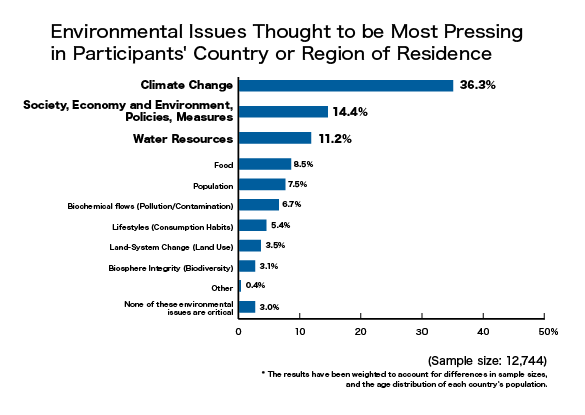
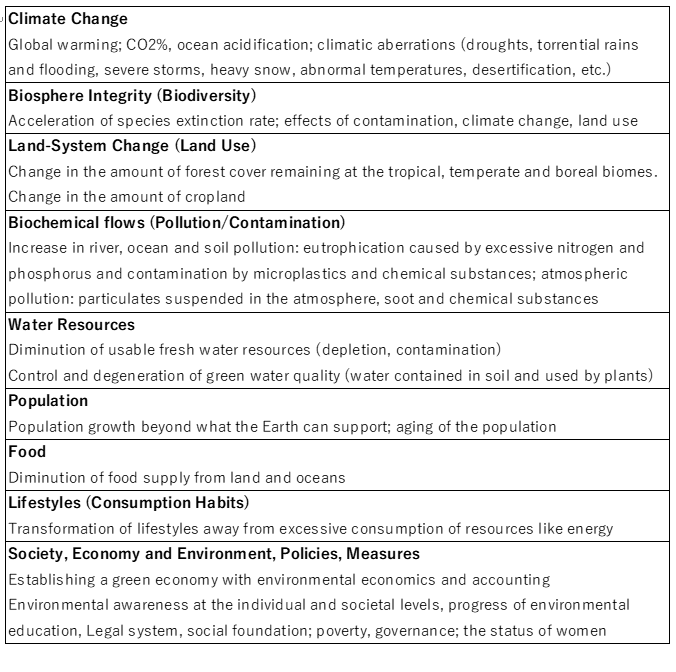
The reasons given for selecting Japan included "cutting-edge technology" and "cleanliness."
Q2.
Please select three countries from the list below that you think are making progress in terms of public awareness and action on environmental issues, and rank them from 1st to 3rd. Please give detailed reasons for your responses.
The list consisted of the top 50 countries shown in the "2022 SDG Index & Dashboards," a by-country ranking of the progress made towards achieving the Sustainable Development Goals set forth by the United Nations.
- Overall, the countries thought to be making progress in terms of public awareness and action on environmental issues were Japan (1st), the USA (2nd) and Australia (3rd). Participants in developing countries such as Indonesia, Egypt and China tended to put Japan in first position. Common reasons given included "cutting-edge technology" and "cleanliness."
- Among the 25 countries in which this survey was carried out, 14 were in the top 50 countries shown in the "2022 SDG Index & Dashboards" (South Korea, Japan, Australia, USA, Canada, UK, France, Germany, Italy, Spain, Belgium, Poland, Norway and Sweden). 13 of those countries put themselves in the top position, with Spain being the only exception.
- The most common reasons given for each country are listed below.
Some omissions have been made. <Japan>
"Japan has cutting-edge technology in such fields as recycling and waste disposal."
"Japan humbly follows the rules, and tackles environmental issues."
"The streets are free of garbage, and people take care to sort their garbage."
<USA>
"As a global superpower, the USA has the knowledge and technology to spread awareness."
"There seem to be a lot of protests, demos and campaigns in the US."
"People in the US are encouraged to be more aware of environmental issues, and to take action."
<Australia>
"Australia proactively preserves mangrove forests, protects wild animals such as koalas, and so on."
"It is implementing many policies in response to forest fires."
"Many of its products are organic, or are designed with sustainability in mind."
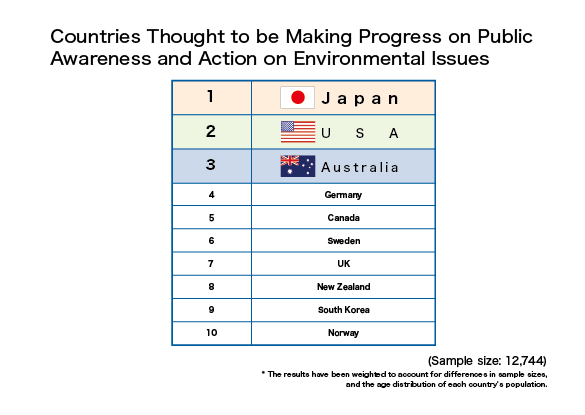
The Sustainable Development Goals that participants thought will have the highest level of realization by 2030 were "No Poverty" (1st), "Good Health and Wellbeing" (2nd), and "Zero Hunger" (3rd). The SDGs that participants thought would have the lowest level of realization were "No Poverty" (1st), "Zero Hunger" (2nd), and "Quality Education" (3rd). Opinions were split on whether poverty can be eradicated, even among people from the same country, with developed nations giving more pessimistic answers.
Q3. Out of the 17 Sustainable Development Goals, please select three goals that will have the highest (or lowest) level of realization in your country or region in 2030, and rank them from first to third. Please answer using the corresponding Sustainable Development Goal numbers. The 17 Sustainable Development Goals (SDGs), adopted at a United Nations summit in September 2015, are an international plan to build a better, more sustainable world by 2030.
- Overall, the SDGs expected to have the highest level of realization by 2030 were "1. No Poverty" (1st), "3. Good Health and Wellbeing" (2nd) and "2. Zero Hunger" (3rd).
- In this year's survey of global environmental experts, conducted by the Asahi Glass Foundation, the SDG that was predicted to have the highest level of realization in each participant's country or region by 2030 was "6. Clean Water and Sanitation."
- Overall, the SDGs expected to have the lowest level of realization by 2030 were "1. No Poverty" (1st), "2. Zero Hunger " (2nd) and "4. Quality Education" (3rd). As for "1. No Poverty," people's expectations varied widely, even among those from the same country. Participants in developed nations such as the USA, France, Belgium and Norway tended to be more pessimistic, while those in developing nations, such as Indonesia, India and Egypt, tended to be more optimistic.
-
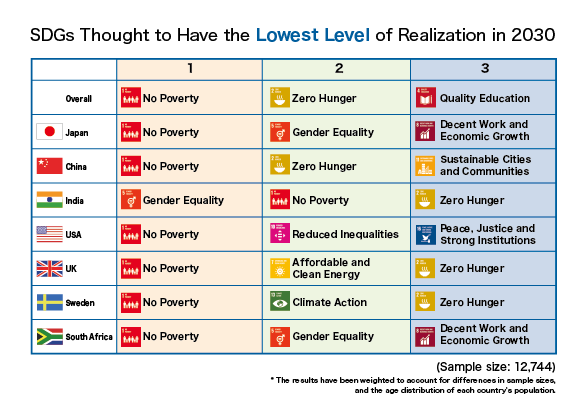
Around 30% of participants hadn't heard of the SDGs, though 18-24-year-olds had a slightly higher awareness than 25-69-year-olds.
Q4. Had you ever heard of the Sustainable Development Goals (SDGs) before answering Question 3?
- On average, 14.7% of participants answered " I am very familiar with them." 25.2% answered "I have read about them," 28.8% answered "I am somewhat aware of them," and 31.3% answered "I wasn't aware of them."
- 22.0% of 18-24-year-olds answered "I am very familiar with them," which was 8.6 percentage points higher than 25-69-year-olds at 13.4%. 22.9% of 18-24-year-olds answered "I wasn't aware of them," which was 9.9 percentage points lower than 25-69-year-olds at 32.8%.
- India displayed the highest level of awareness, with only 11.4% of participants answering "I wasn't aware of them." The USA displayed the lowest level of awareness, with 58.5% of participants giving that answer.
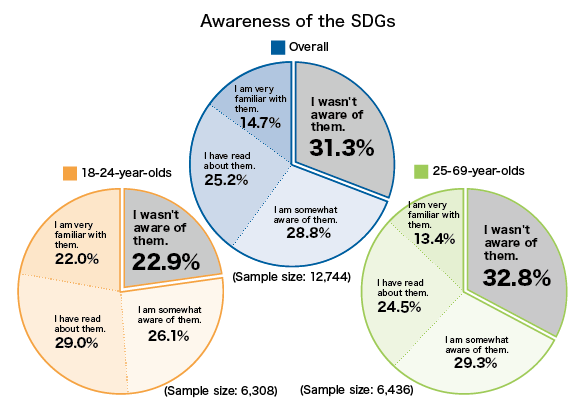
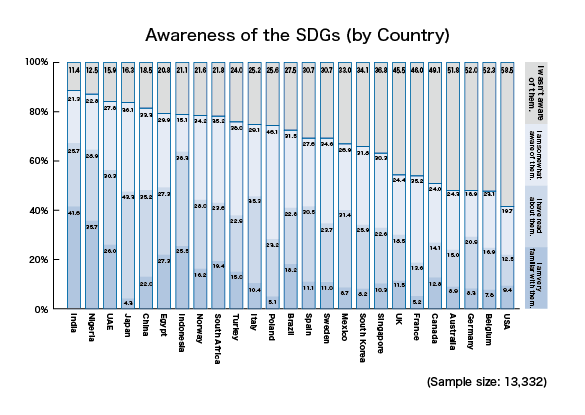
When showing environmental crisis awareness time on a clock, from 0:01 to 12:00, participants averaged out at 7:25, meaning "fairly concerned." 18-24-year-olds averaged out slightly lower at 7:11, while 25-69-year-olds were at 7:27, meaning they were slightly more concerned.
The average time given by global environmental experts was two hours ahead of the general public, at 9:35, "extremely concerned." Both experts and the general public expressed a sense of crisis.Q5. The following figure shows the Environmental Doomsday Clock which, by the position of the hands on the clock, shows the perceived degree of crisis towards environmental issues. Please indicate your sense of crisis toward environmental issues in your country or region by using hours and minutes between 0:01 and 12:00, e.g. "HH:MM." For the purpose of calculating results, please select your times in units no smaller than 10 minutes.
- Overall, participants showed environmental crisis awareness at 7:25, meaning "fairly concerned." 18-24-year-olds averaged out slightly lower at 7:11. 25-69-year-olds averaged out at a later time 7:27. Both age groups fell into the "fairly concerned" bracket.
- In this year's survey of global environmental experts, conducted by the Asahi Glass Foundation, the average time was 9:35, meaning "extremely concerned." That's around two hours later than the time given by the general public.
- The most common reason given was concern about abnormal weather conditions and temperatures in all countries and regions.
- Other reasons are listed below.
Some omissions have been made.
"Natural disasters keep happening, one after another."
"I'm worried about what the world will be like when today's kids grow up."
"So many things feel out of our control."
"We're at point where any action we take seems too late."
"The world is under a lot of pressure from factors such as climate change, overpopulation, and a shortage of food and resources."

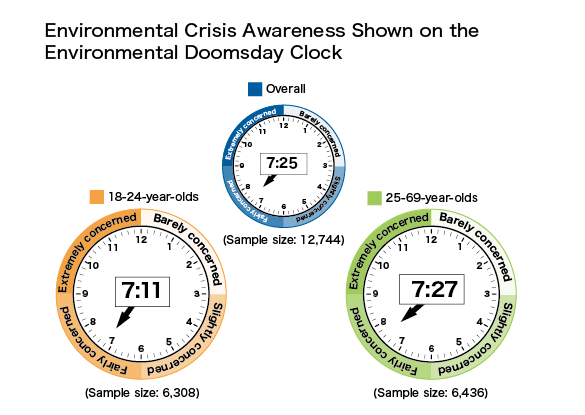
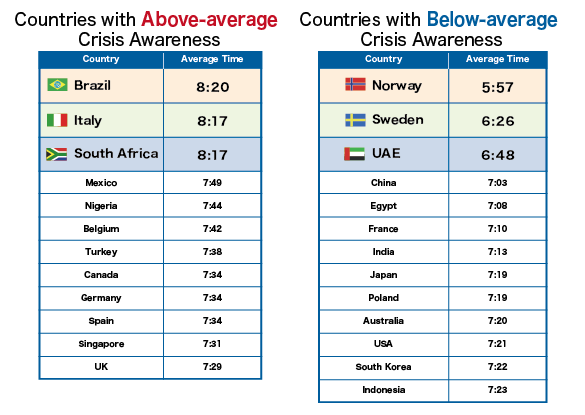
Remarks from the Survey's Supervisor
This time, the survey was conducted both in and outside of Japan. It was a very interesting set of results, as it allows us to see the differences in opinion between Japan and other countries, as well as global awareness of environmental issues.
All around the world, climate change is seen as a critical environmental issue. I believe that viewing this alongside socioeconomic issues highlights the problems faced by modern society. It's important that environmental issues are increasingly seen as social and economic issues too. Climate change is a global problem, and there's a pressing need to strengthen our response. We can see a growing awareness of that fact.
I was a little surprised to see countries like Japan and the USA put forward as nations making progress on awareness and action regarding environmental issues. Many studies have concluded that European countries are further ahead. So there's a gap between fact and opinion. I'd like to see Japan and the USA implement proactive measures in order to catch up with their image.
In Japan, awareness of the SDGs is higher than many other countries, but the percentage of people who said they were "very familiar" was among the lowest of countries surveyed. I think we should really pay attention to that finding. It shows a strong need for measures that don't simply address the SDGs in a superficial way.
Both in Japan and abroad, "No Poverty" was the SDG expected to have the highest level of realization, and the lowest. It was rated the first in both categories, which shows just how difficult solving that problem is likely to be. It's said that global inequality is growing, and differences of opinion are widening. This finding is a good illustration of that point. Following the advent of COVID-19, there is also said to be a widening gap between those who grew poorer, and were left behind, versus those who benefitted economically from the pandemic. And that trend seems to be influencing people's viewpoints. I believe that this survey shows how important it is to close the gap.
The hands of the Environmental Doomsday Clock have moved forward significantly since last year. And I hope that we can turn our awareness of the crisis into concrete action.Profile of the Survey's Supervisor

Norichika Kanie
Professor, Graduate School of Media and Governance, Keio UniversityKanie is also the director of the xSDG Laboratory, within the Keio Research Institute at SFC. Before joining Keio, he worked at the Tokyo Institute of Technology's Graduate School of Decision Science and Technology, and the University of Kitakyushu's Department of Policy Studies.
Kanie serves on various committees and steering groups. He is a member of the SDGs Promotion Roundtable Meeting, established by the Japanese government under the SDGs Promotion Headquarters; he is a member of the Expert Study Group for the Promotion of SDGs by Local Governments for the Japanese Cabinet Office; and for four years from 2017 he was an External Director at RENOVA Inc.
Kanie's research focuses on International Relations, Sustainability Science and Earth System Governance. He participated in the formulation of the Sustainable Development Goals (SDGs), the common goals adopted by the United Nations, from the conception stage. He is a leading authority on the SDGs, and is striving to balance research and practice. He recently published "SDGs (Sustainable Development Goals)" (Chukoshinsho, 2020), and has been selected as one of 15 independent scientists that will draft the second quadrennial Global Sustainable Development Report. Kanie received his Ph.D. in Media and Governance from Keio University.
